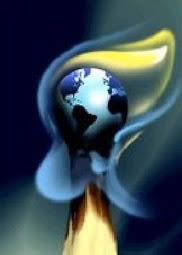
It's always been a disturbing what-if scenario for climate researchers: Gas hydrates stored in the Arctic ocean floor -- hard clumps of ice and methane, conserved by freezing temperatures and high pressure -- could grow unstable and release massive amounts of methane into the atmosphere. Since methane is a potent greenhouse gas, more worrisome than carbon dioxide, the result would be a drastic acceleration of global warming. Until now this idea was mostly academic; scientists had warned that such a thing could happen. Now it seems more likely that it will.
.................
Russian polar scientists have strong evidence that the first stages of melting are underway. They've studied [the] largest shelf sea in the world, off the coast of Siberia, where the Asian continental shelf stretches across an underwater area six times the size of Germany, before falling off gently into the Arctic Ocean. The scientists are presenting their data from this remote, thinly-investigated region at the annual conference of the European Geosciences Union this week in Vienna.
The implications are dire:
The permafrost has grown porous, says Shakhova [coauthor of the Russian study], and already the shelf sea has become "a source of methane passing into the atmosphere." The Russian scientists have estimated what might happen when this Siberian permafrost-seal thaws completely and all the stored gas escapes. They believe the methane content of the planet's atmosphere would increase twelvefold. "The result would be catastrophic global warming," say the scientists. The greenhouse-gas potential of methane is 20 times that of carbon dioxide, as measured by the effects of a single molecule.

Greg Craven wraps it up in a nutshell...






























